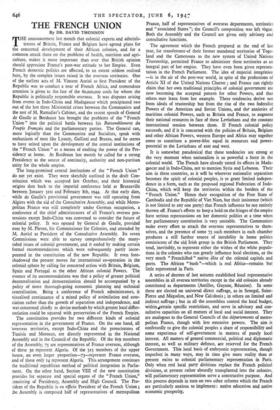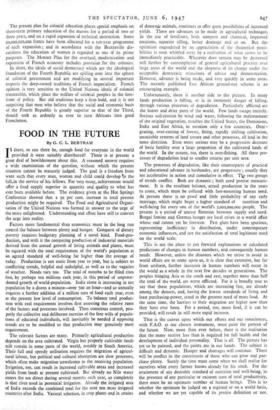THE FRENCH UNION
By DR. DAVID THOMSON
THE announcement last month that colonial experts and adminis- trators of Britain, France and Belgium have agreed plans for the concerted development of their African colonies, and for a common attack there on the problems of health, nutrition and agri- culture, makes it more important than ever that British opinion should appreciate France's post-war attitude to her Empire. Even French domestic politics are affected, to an extent seldom realised here, by the complex issues raised in the overseas territories. One of the earliest acts of M. Vincent Auriol as first President of the Republic was to conduct a tour of French Africa, and tremendous attention is given to the fate of the 6o,000,000 souls for whom the Republic is politically responsible overseas. It was disputes arising from events in Indo-China and Madagascar which precipitated two out of the last three Ministerial crises between the Communists and the rest of M. Ramadier's Cabinet, and the recent speech of General de Gaulle at Bordeaux has brought the problems of the "French Union" into the political battle between his Rassemblement du Peuple Francais and the parliamentary parties. The General can, more logically than the Communists and Socialists, speak with enthusiasm of men like Lyauty, Gallieni and Brazza, and he seems to have seized upon the development of the central institutions of the "French Union" as a means of exalting the power of the Pre- sidency at home. At Bordeaux last month he called for a strong Presidency as the source of continuity, authority and non-partisan unity for the whole empire.
The long-promised central institutions of the "French Union" do not yet exist. They were sketchily outlined in the draft Con- stitution which was accepted last October, and their historical origins date back to the imperial conference held at Brazzaville between January 31st and February 8th, 1944. At that early date, while de Gaulle's provisional government was still operating from Algiers with the aid of the Consultative Assembly, and while Metro- politan France was still completely under German occupation, a conference of the chief administrators of all France's oversea pos- sessions except Indo-China was convened to consider the future of colonial policy. It was opened by General de Gaulle, presided over by M. Pleven, his Commissioner for Colonies, and attended by M. Auriol as President of the Consultative Assembly. Its seven Commissions were able to survey comprehensively the many- sided issues of colonial government, and it ended by making certain formal recommendations which were subsequently partly incor- porated in the constitution of the new Republic. It even fore- shadowed the present moves for international co-operation in the colonial sphere by calling for concerted action with Britain, Belgium, Spain and Portugal as the other African colonial Powers. The essence of its recommendations was that a policy of greater political decentralisation and democratisation should be accompanied by a policy of more thorough-going economic planning and technical centralisation. Being a conference of French administrators, it visualised continuance of a mixed policy of assimilation and asso- ciation rather than the growth of separatism and independence, and was concerned chiefly to devise methods by which greater local differ- entiation could be squared with preservation of the French Empire.
The constitution provides for two different kinds of colonial representation in the government of France. On the one hand, all "overseas territories, except Indo-China and the protectorates of Tunisia and Morocco, are directly represented in the National Assembly and in the Council of the Republic. Of the 619 members of the Assembly, 75 are representatives of France overseas, although of these 30 represent Algeria. Of the 315 members of the upper house, an even larger proportion-73—represent France overseas, and of these only 14 represent Algeria. This arrangement continues the traditional republican method of political integration in Parlia- ment. On the other hand, Section VIII of the new constitution provides for separate and special organs of the "French Union," :onsisting of Presidency, Assembly and High Council. The Pre- ;ident of the Republic is ex officio President of the French Union ; the Assembly is composed half of representatives of metropolitan France, half of representatives of overseas departments, territories and "associated States "; the Council's composition was left Vague. Both the Assembly and the Council are given only advisory and consultative functions.
The agreement which the French prepared at the end of last year, for transference -of their former mandated territories of Togo- land and the Cameroons to the new system of United Nations Trusteeship, permitted France to administer these territories as an integral part of her empire. They have even been given represen- tation in the French Parliament. The idea of imperial integration —is in the air of the post-war world, in spite of the professions of Article XI of the United Nations Charter ; and France can rightly claim that her own traditional principles of colonial government are now becoming the accepted pattern for other Powers, and that others may learn from her example. These tendencies derive not from ideals of trusteeship but from the rise of the two federalist Powers of the American and Soviet Unions, and the anxieties of maritime colonial Powers, such as Britain and France, to augment their national resources in face of these Leviathans and the constant international tension between them. If French colonial policy succeeds, and if it is concerted with the policies of Britain, Belgium and other African Powers, western Europe and Africa may together come to constitute a power-bloc equal in resources and power- potential to the Leviathans of east and west.
It is somewhat paradoxical that these tendencies are strong at the very moment when nationalism is so powerful a force in the colonial world. The French have already tasted its effects in Mada- gascar and in Indo-China, not to mention Syria and Lebanon. Their aim in these countries, as it will be wherever nationalist separatism becomes the spirit of colonial peoples, is to grant limited indepen- dence in a form, such as the proposed regional Federation of Indo- China, which will keep the territories within the borders of the "French Union." Hence their recognition of the Free State of Cambodia and the Republic of Viet Nam, but their insistence (which is not limited to any one party) that French influence be not entirely thrown off. France's efforts to keep a hold on the fringes of the empire have serious repercussions on her domestic politics at a time when her parliamentary constitution is very unstable. The Communists make every effort to attach the overseas representatives to them- selves, and the presence of some 75 such members in each chamber produces a still further source of instability in home politics reminiscent of the old Irish group in the British Parliament. They tend, inevitably, to represent either the wishes of the white popula- tions in the colonies who can greatly influence local elections, or the very much " Frenchified " native elite of the colonial capitals and ports. The African "bush "—which is real Africa—remains but little represented in Paris.
A series of decrees of last autumn established local representative assemblies in all oversea territories except in the old colonies already constituted as departments (Antilles, Guyane, Reunion). In some these are elected on universal direct suffrage, as in Senegal, Saint- Pierre and Miquelon, and New Calzdonia ; in others on limited and indirect suffrage ; but in all the assemblies control the local budget, within.certain specific restrictions, and serve in advisory and con- sultative capacities on all matters of local and social interest. They are analogous to the General Councils of the dit>artements of metro- politan France, though with less extensive powers. The aim is confessedly to give the colonial peoples a share of responsibility and some experience of self-government in matters of purely local interest. All matters of general commercial, political and diplomatic interest, as well as military defence, are reserved for the French Government. This local basis of embryonic representation, though imperfect in many ways, may in time give more reality than at present exists to colonial parliamentary representation in Paris. Only when real local party divisions replace the French political divisions, at present rather absurdly transplanted into the colonies, will parliamentary representation serve a constructive purpose. And this process depends in turn on two other reforms which the French are particularly anxious to implement: native education and native economic prosperity. The present plan for colonial education places special emphasis on short-term primary education of the masses for a period of two or three years, and on a rapid expansion of technical instruction. Some 20,000,000,000 francs have been allocated for a ten-year programme of such expansion ; and in accordance with the Brazzaville dis- cussions the education of women is regarded as one of its prime purposes. The Monnet Plan for the overhaul, modernisation and expansion of French economy includes provision for the colonies.
In short, the ideals of social democracy which are the ideological foundation of the Fourth Republic are spilling over into the sphere of colonial government and are modifying in several important respects the deep-rooted traditions of French imperialism. French opinion is very sensitive to the United Nations ideals of colonial trusteeship, which place the welfare of coldnial peoples in the fore- front of policy. But old traditions keep a firm hold, and it is not surprising that men who believe that the social and economic basis of the. Fourth Republic is greatly superior to that of the Third, should seek as ardently as ever to turn Africans into good Frenchmen.



































 Previous page
Previous page